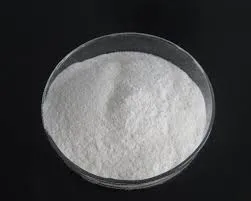
ડીસેમ્બર . 16, 2024 12:59 Back to list
Understanding Hydroxypropyl Methyl Cellulose as an Ingredient in Dietary Supplements
Hydroxypropyl Methyl Cellulose in Supplements An Overview
Hydroxypropyl methyl cellulose (HPMC), a derivative of cellulose, has gained popularity in the dietary supplement industry due to its unique properties and versatility. As a non-toxic and biodegradable substance, HPMC is often used as a thickening agent, emulsifier, and forming agent in a variety of products, including food, pharmaceuticals, and, notably, dietary supplements. This article explores the applications, benefits, and considerations of HPMC in supplementation.
What is Hydroxypropyl Methyl Cellulose?
Hydroxypropyl methyl cellulose is synthesized from cellulose, a natural polymer obtained from plant cell walls. The process involves etherification, where the hydroxyl groups of the cellulose molecules react with propylene oxide and methyl chloride. This modification results in a substance that is soluble in water and organic solvents, giving HPMC its unique properties. The compound varies in viscosity and solubility based on its molecular weight and the degree of substitution of the hydroxyl groups with methyl and hydroxypropyl groups.
Applications of HPMC in Supplements
HPMC is widely used in the production of dietary supplements for several reasons
1. Binding Agent In tablet formulations, HPMC acts as a binding agent, ensuring that the ingredients cohere effectively during the manufacturing process and maintain their shape and integrity when ingested.
2. Coating Agent The compound is often utilized in film coating capsules and tablets. The coating not only protects the active ingredients from environmental factors but also aids in the controlled release of these ingredients, enhancing bioavailability.
3. Thickening Agent When added to liquid supplements, HPMC increases the viscosity, providing a smoother texture and mouthfeel. This property is especially valuable in beverages and gels, where a thicker consistency may improve user experience.
4. Suspending Agent HPMC effectively helps in suspending solid particles in a liquid medium, making it an ideal choice for suspensions containing vitamins, minerals, or herbal extracts.
5. Stabilizer By stabilizing emulsions, HPMC ensures that the ingredients do not separate over time, extending the shelf life of the products.
Benefits of Using HPMC
hydroxypropyl methyl cellulose in supplements

1. Safety and Tolerance HPMC is considered safe for consumption and has been recognized by regulatory authorities like the FDA. It is non-toxic, non-allergenic, and does not cause gastrointestinal distress, making it suitable for a wide range of consumers.
2. Vegetarian and Vegan Friendly As a plant-derived product, HPMC is a preferred ingredient for vegetarian and vegan supplements. It serves as an alternative to gelatin, which is derived from animal sources.
3. Controlled Release Supplement manufacturers often utilize HPMC's ability to form gels at various pH levels, allowing for the controlled release of active ingredients over time. This feature can enhance the bioavailability of certain nutrients, ensuring that the body can absorb them more efficiently.
4. Enhanced Stability HPMC contributes to the stability of supplements by protecting sensitive ingredients from degradation due to moisture and air exposure, thereby extending their shelf life.
Considerations When Using HPMC
While HPMC is a beneficial ingredient in dietary supplements, there are considerations to keep in mind
1. Source and Quality The quality of HPMC can vary based on the manufacturing process and sources. It's essential for consumers to choose reputable brands that ensure the quality and purity of HPMC in their supplements.
2. Dosage and Formulation The effectiveness of HPMC largely depends on the dosage and formulation. Manufacturers need to carefully calculate the appropriate amount to optimize its benefits in products.
3. Individual Tolerance Although HPMC is generally well-tolerated, individual responses may vary. Consumers should consult healthcare professionals if they have specific concerns or pre-existing conditions.
Conclusion
Hydroxypropyl methyl cellulose is an invaluable ingredient in the dietary supplement industry, providing numerous benefits that enhance product formulation and user experience. Its properties as a binder, thickener, and stabilizer make it essential for various supplements. Increased demand for vegetarian and vegan products also favors its use, as HPMC provides a plant-based alternative to traditional ingredients. As the supplement market continues to evolve, HPMC's role is likely to grow, offering formulations that prioritize safety, efficacy, and consumer preferences. Understanding its applications and benefits can aid consumers in making informed choices about the supplements they choose to incorporate into their diets.
-
The Widespread Application of Redispersible Powder in Construction and Building Materials
NewsMay.16,2025
-
The Widespread Application of Hpmc in the Detergent Industry
NewsMay.16,2025
-
The Main Applications of Hydroxyethyl Cellulose in Paints and Coatings
NewsMay.16,2025
-
Mortar Bonding Agent: the Key to Enhancing the Adhesion Between New and Old Mortar Layers and Between Mortar and Different Substrates
NewsMay.16,2025
-
HPMC: Application as a thickener and excipient
NewsMay.16,2025
-
Hec Cellulose Cellulose: Multi functional dispersants and high-efficiency thickeners
NewsMay.16,2025







